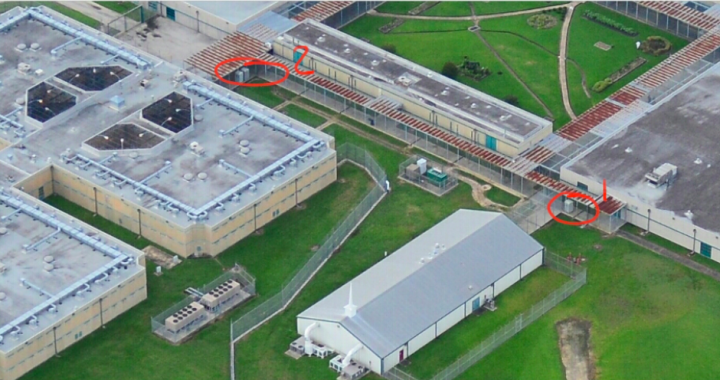FOR IMMEDIATE RELEASE
September 15, 2017
Contact: Paul Stanley Holdorf, Esq.
908-591-1589 | plan@nlg.org
The Prisoners Legal Advocacy Network (PLAN) administered by the National Lawyers Guild’s Delaware-New Jersey Chapter (NLG DE-NJ) has convened a legal response team to investigate and challenge deplorable conditions in numerous Texas Department of Criminal Justice (TDCJ) prison facilities in the aftermath of Hurricane Harvey.
On Wednesday, September 13, 2017, NLG attorneys served TDCJ with notice of the reports of unconstitutional conditions of confinement received by prisoners and their loved ones. Preparations are underway to file a class action suit on behalf of prisoners who have suffered harm due to TDCJ’s apparent failure to take reasonable steps to maintain safe and humane conditions following Hurricane Harvey.
More than two weeks after Hurricane Harvey made landfall, dozens of prisoners and their family members report that many TDCJ prisoners remain without toilet and showering facilities, with some units reporting continued lack of access to adequate food and water. There are compelling indications that disruptions to mail delivery and other communications channels also remain ongoing.
There are widely corroborated reports of missed meals, lack of adequate access to water, and suspended dispensation of prescription medication in the immediate aftermath of the storm.
PLAN has received dozens of independent reports, both from eyewitness observers and family members in direct contact with prisoners and prison personnel, some of them signed affidavits executed under penalty of perjury.
Civil Air Patrol aerial photographs taken approximately one week following Hurricane Harvey appear to support claims that insufficient portable toilet facilities are available to prisoners at TDCJ’s Gist, Leblanc, and Stiles Units.
TDCJ’s failure to evacuate some units in storm-affected areas is compounded by TDCJ’s mismanagement of those evacuations that did occur. There are compelling indications that those TDCJ prisoners who were evacuated were transported to facilities that were already over-crowded. There are also reports that as many as 600 medically vulnerable prisoners were transferred to Wallace Unit, in apparent violation of a July 2017 court order that deemed that facility unfit to house such prisoners.
That TDCJ’s attempt to address unconstitutional prison conditions was to transport prisoners from one unconstitutional prison environment to another suggests convincingly that TDCJ failed to prepare or implement a sound storm evacuation strategy, despite the apparent availability of Federal Emergency Management Administration (FEMA) resources and support.
Says Paul Stanley Holdorf, co-chair of the NLG Delaware-New Jersey Chapter and supervising attorney for PLAN, “We are appropriately concerned by the grievous human rights violations corroborated by numerous independent eyewitness reports. The remarkable consistency in these allegations establishes convincingly both the seriousness of the situation at storm-affected TDCJ facilities, and the fact that rights-violating conditions persist even weeks after the storm. As Jefferson county is known to be situated in a coastal floodplain vulnerable to tropical storms, TDCJ’s inadequate preparation for this foreseeable event constitutes a clear failure to uphold their most basic due diligence obligations to ensure safe and humane conditions for the human beings entrusted to their care.”
PLAN continues to consolidate facts and evidence in relation to the conditions at both storm-affected TDCJ facilities, and TDCJ units that received evacuees. Concerned prisoners and their loved ones can contact PLAN by email: plan@nlg.org.
A parallel effort is proceeding in relation to the prevailing conditions at the FBOP Federal Correctional Complex in Beaumont. PLAN filed a separate notice with FBOP earlier this week. Read the full notice to TDCJ with statements and photos here.
# # #
RELATED:
- 9/11/17: DE-NJ NLG Prisoners’ Legal Advocacy Network (PLAN) Challenges Deplorable Prison Conditions at USP Beaumont
- 9/8/17: Democracy Now! – Texas Prisoners Are Facing Horrid Conditions After Hurricane Harvey & Retaliation for Reporting Them
Image: Civil Air Patrol aerial photograph (evidence that was included in the notice to TDCJ) taken September 1 of just three portable toilets at Stiles Unit Northwest. According to OSHA requirements that specify one portable toilet per 20 individuals, a facility like Stiles Unit (pictured here) with a maximum prisoner capacity of 2,981, should have approximately 149 portable toilets. This is one of a series of Stiles Unit photographs dated September 1 that show a combined number of portable toilet well below this minimum requirement.



